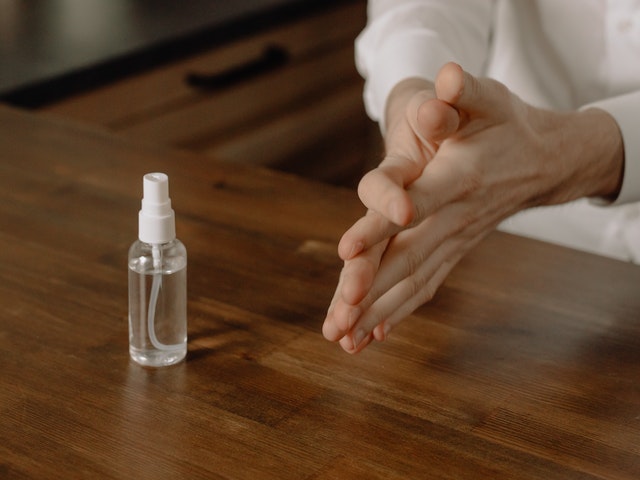04 September 2020 | Updated 10 September 2020
Dr Andrew Kemp has told a national newspaper that it’s not yet been proven that alcohol-based hand sanitiser could kill the virus that causes COVID-19 on skin.
The Head of Scientific Advisory Board at the British Institute of Cleaning Science (BICSc) and specialist in disinfection and decontamination told the Daily Express newspaper that: “Hand gels should only be used as a last resort and as a short term temporary measure or stop-gap if soap and water are not available.”
He also stated that there is “no published proof that alcohol gels kill COVID-19 itself.”
“Recent research shows the surviving bugs which are not killed by alcohol gels are themselves highly dangerous pathogens and may increase in numbers. This means our routine use of gels could ultimately cause us more harm than good.”
–Dr Andrew Kemp
Head of Scientific Advisory Board at the British Institute of Cleaning Science
“Claims on Many Hand Gels That They Kill 99.9 Per Cent of Bacteria are Misleading”
Kemp continued:
“I am not aware of any hand sanitiser that has been tested against all species of bacteria. What they actually mean is that they kill 99.9 per cent of the bacterial species they tested against. At the moment there is no published proof that alcohol gels kill COVID-19 itself.
“Even if they did kill 99.9 per cent of all bacteria, there can be more than a million bacteria on your hands at any one time leaving 10,000 alive after sanitisation. These will be in a residue of sugar and protein. Some species of bacteria can thrive on this.”
Kemp also suggests that an over-reliance on alcohol-based hand sanitising gels may contribute to surviving bugs becoming stronger and greater in number:
“Recent research shows the surviving bugs which are not killed by alcohol gels are themselves highly dangerous pathogens and may increase in numbers. This means our routine use of gels could ultimately cause us more harm than good.”
World Health Organisation Guidance states that for best protection, hands should be washed with soap and water, and alcohol-based hand rub can be used if you don’t have immediate access to soap and water.
Kemp will present his findings at the International Conference on Antimicrobial Resistance conference in Amsterdam, October 2022.
Editor's note: Dr Kemp's comments are representative of his personal views and do not represent those of BICSc
Picture: A photograph of someone using hand sanitising gel
Article written by Ella Tansley | Published 04 September 2020
Share
Related Articles
Alcohol-Free Hand Sanitiser Offers Green Alternative to Hand Hygiene
Biotech innovators BioHygiene have once again bucked the trend and manufactured an accredited foam hand sanitiser that contains no alcohol or quats – taking the...
Read Full Article
7 Ways to Improve Office Hygiene and Cleanliness
With businesses already putting plans in place to get people back into the office, ensuring good hygiene practices is paramount in preventing any spread of coronavirus in...
Read Full Article
Sanitiser Industry Urges Government to Adopt Better Regulations
The safety of children and vulnerable adults could be at risk due to the wave of under-regulated alcohol-based hand sanitisers on the market.
According to...
Read Full Article
Smart Hand Sanitisers To Provide Data for Workplace Managers
Smart hand sanitisers that can provide data on workplace hand hygiene are being trialled across the country, as part of research into how best to engage people with the...
Read Full Article
School Closures – How Effective Are School’s COVID Safety Measures?
With schools now closed until at least 8 March, what safety measures must schools take to support their reopening?
Schools in England will now be closed to all but...
Read Full Article
Hand Sanitiser – What are the Expectations in Buildings?
The results of a new study show what the public expect to see when it comes to hand sanitiser provisions in public spaces in Europe.
Conducted during the summer of...
Read Full Article
BICSc Releases Long-Awaited Industry Standards and Best Practice Guidelines
The British Institute of Cleaning Science has released the much-needed industry publication: “BICSc Standards & Best Practice.”
At a time where...
Read Full Article
The Manchester Cleaning Show – Online at a Pivotal Time
Organisers have unveiled details regarding the virtual version of the Manchester Cleaning Show and promised it will be unmissable for anyone connected to the...
Read Full Article
Fighting Coronavirus – Can Window Cleaners Help?
The Federation of Window Cleaners says that thousands have the kit needed to disinfect public areas nationwide, to aid the COVID-19 response.
The window cleaning...
Read Full Article
Use a Hand Dryer or Paper Towels – But Please Not Your Clothing
With hand washing at the very top of the news agenda right now, it’s important to note that good hand hygiene includes both washing and drying hands thoroughly,...
Read Full Article

.gif)
.gif)



.gif)





.png)

.png)
